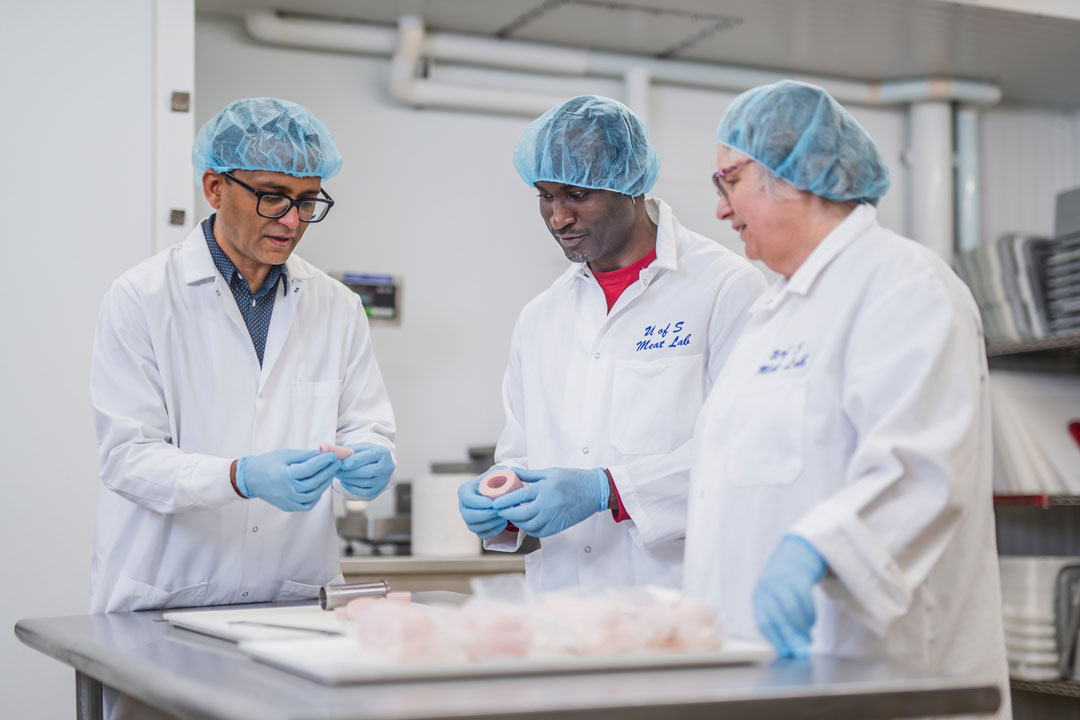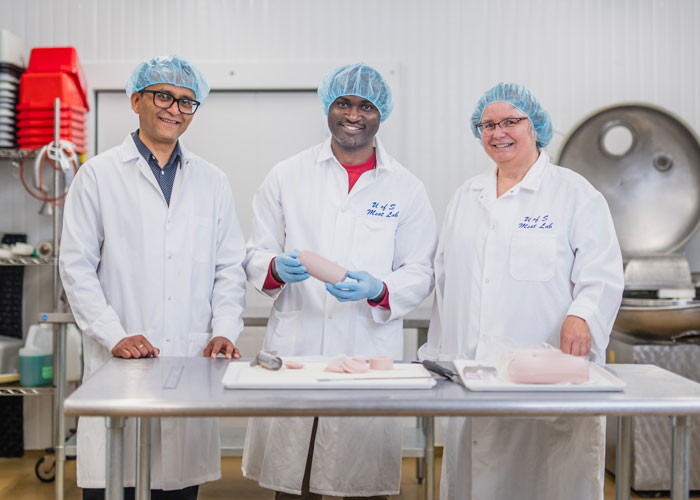
Meet the new meat
Surveys say novel hybrid products created at USask taste great.
By Joanne PaulsonMeat, packed with protein, is generally good for you. Processed meat, somewhat less so.
But what if you could replace “bad” fat in, say, deli meat, sausages and burgers, with a healthier option — and without sacrificing taste and texture?
University of Saskatchewan (USask) researchers Dr. Supratim Ghosh (PhD) and Dr. Phyllis Shand (PhD) are on it.
Ghosh, a professor in the Department of Food and Bioproduct Sciences (FABS) in the College of Agriculture and Bioresources, came up with the idea of keeping the protein part of meat products while removing the animal fat and replacing it with plant-based material.
“The animal fats are high in saturated fat and cholesterol, so that’s why I’m developing the saturated fat replacer using canola oil and pulse protein,” Ghosh explained.
Shand, a professor emerita in FABS, brought her expertise to the project along with the invaluable help of their PhD student, Oluwafemi Coker, and their former post-doctoral fellow, Dr. Fatemeh Keivaninahr (PhD).
“There’s a large group of meat products that can take advantage of this,” she said. “We’re able to reduce the overall amount of fat in the product; plus, this fat replacer we’re hoping replaces those sensory properties, the flavour, the mouth feel of the fat.
“The bonus is we’re getting some extra protein from the plant-based protein we’re adding.”
Granted funding by Saskatchewan’s Agriculture Development Fund and SaskCanola, they are now nearing the end of the project with the last of a series of taste tests, which have proved very popular.
“We’ve evaluated it now in several different types of meat products,” said Shand.
In the first test, they used it in a bologna-style, finely chopped sausage, similar to a hot dog or a deli meat. Subsequently, they tried it in a breakfast sausage, and Coker has just run a consumer panel, comparing hybrid burgers to full-fat and low-fat beef burgers.
He has had no trouble generating interest.
“One asked, can I come again next week and do it again?” Shand said with a chuckle.
From lab bench to production
The project, which began before and was delayed by the COVID-19 pandemic, began on a small scale on the lab bench using faba bean protein donated by AGT Food and Ingredients.
“We made something called an emulsion; an oil droplet coated by protein. The droplets are tiny at 500 nanometres, coated by the protein,” Ghosh said. “We processed them in a way that the protein acts as a glue and binds the oil droplet together.
“The pulse protein emulsifies the oil into smaller droplets and then converts that emulsion into a gel. That gelling process is happening due to the faba bean protein property.”
Next, the emulsion-based fat replacer was scaled up to the amounts needed for pilot-scale meat processing at the Saskatchewan Food Industry Development Centre Inc., using the college’s equipment. Then, the hybrid meat products were made at the college’s food processing pilot plant.
Part of the process was also to study the product at the Canadian Light Source (CLS) at the molecular level.
“It was pretty cool to use the CLS technology to visualize the microstructure of the product and the original gel,” Ghosh said.
Many scientists are trying similar things, but this project is the first to be successful with faba bean protein. The taste-testing is also rare, if not unique.
“When we go to conferences and talk about it, people always ask, did you test it? How does it taste?” Ghosh said.
“Normally, we don’t do that. We make things in lab. But that’s the novel part with our pilot plant, that we could make a food-grade product, and we have the approval of the University of Saskatchewan Behavioural Ethics Board to do the human testing. That was pretty cool. It’s really exciting.”

And it’s good for you
The new hybrid meats contain half the amount of traditional fat in processed meat products, reducing calories but also the type of fatty acids: canola oil contains only about seven per cent saturated fat and no cholesterol.
“With the making of a processed meat product, we always have to have at least some salt or sodium chloride in there, so we’re not changing that,” Shand said.
“It’s really the fat composition that’s changing. People are now more concerned about saturated fat.”
When the project concludes by year-end, the scientists should have a complete picture of the fatty-acid profile. Meanwhile, positive feedback is coming in. The products hold moisture well and are reported to have good texture.
The only thing they’ve noticed is that the bologna-style product is a paler colour, but otherwise the sensory attributes have been declared similar to the full-fat and low-fat bolognas they used as controls.
“For overall acceptability on a nine-point scale, they were all equally accepted, so they were accepted as much as the traditional product,” Shand said. “That’s a positive outcome.”
In addition, unlike many meat replacement products on the market, “the ingredient statement is pretty clean,” Shand said. “There aren’t unusual-sounding chemical products in it.”
Ghosh noted that meat replacement products often contain nearly 20 different chemicals and ingredients needed to create the meat structure.
“Here, we are keeping the meat product,” he said. “This is not a veggie burger.
“There’s nothing wrong with meat protein. We are improving the nutritional quality of what is there in the meat.”
As far as the market for the product goes, while it will be more expensive to make, Shand said she thinks it will be easily incorporated by meat processors.
“The burgers or the sausages are made in a traditional way, so it’s really not going to change the way processors need to work with it,” she said. “It will appeal to the audiences looking for the health benefits of changing the fatty acid profile together with less fat and calories in general.”
Together, we will undertake the research the world needs. We invite you to join by supporting critical research at USask.

